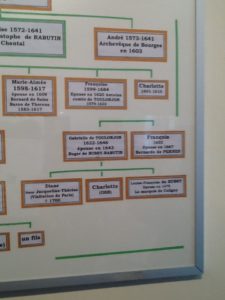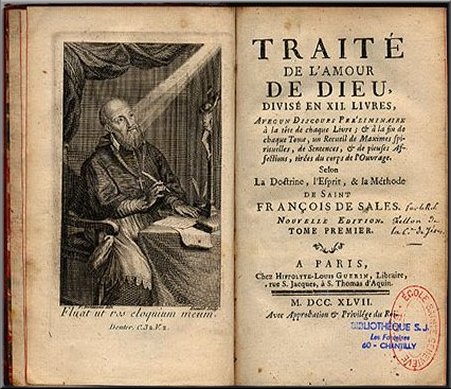 A generation closer to our Foundress, St Jane de Chantal, than Marie-Blanche de Grignan (Sr Francoise Marie, Visitandine) was St. Jane’s great granddaughter, Diane, whose grandmother was Francoise, the only child of St. Jane to survive her. This granddaughter, Diane, also became a Visitation Nun and Superior, with the religious name of Sister Jacqueline Therese, at the Paris Visitation Monastery.
A generation closer to our Foundress, St Jane de Chantal, than Marie-Blanche de Grignan (Sr Francoise Marie, Visitandine) was St. Jane’s great granddaughter, Diane, whose grandmother was Francoise, the only child of St. Jane to survive her. This granddaughter, Diane, also became a Visitation Nun and Superior, with the religious name of Sister Jacqueline Therese, at the Paris Visitation Monastery.
Her vocation story and her life’s path is told in the Annee Sainte, Volume 1.
“God filled with our spirit our dear Sister Jacqueline Therese de Bussy-Rabutin, for the support and the conservation of our Monasteries, many of which were then threatened with complete destruction by the ruin of their finances. She was the daughter of the amiable Gabrielle de Toulongeon, who owed her life to the prayer of our blessed Foundress, her holy grandmother. We know that Ms.de Toulongeon, having lost her first two children, at the moment of their birth, and not expecting the preservation of the third, dragged herself to meet her holy Mother, when she arrived at the castle of Allonne, in 1622, to solicit a blessing that was followed by the happiest result. Shortly thereafter, the desired child came into the world and was named Diane.
A Visitation student
Gabrielle, her mother, died at the age of twenty-five, leaving three daughters whom she wished to entrust to Mother Marie-Helene de Chatellux, her best friend, to be the benefactors of the new Monastery of Avallon; but the Countess de Bussy-Rabutin,mother of her husband, asked that she could raise the eldest of her granddaughters, Diane, and keep her near her. Our dear Sister remained with her grandmother until the age of fifteen. So, twice orphaned, she was placed in our first monastery of Paris as a student. She did not think at that moment that she would one day embrace religious life, so contrary to her nature; but God had chosen her to preserve many of the monasteries that her holy great  grandmother had founded. The examples she had before her touched her; a few months had scarcely elapsed when she begged a novice, at the moment of making profession, to obtain for her, the grace of a vocation. This prayer was answered.
grandmother had founded. The examples she had before her touched her; a few months had scarcely elapsed when she begged a novice, at the moment of making profession, to obtain for her, the grace of a vocation. This prayer was answered.
Becoming a Visitandine Nun
Finally, she was clothed in our holy habit. This dear Sister was noted during her novitiate for an ever-increasing fervor.
But her family affairs delaying her consecration, the demon used this delay to afflict her with a violent temptation against her holy state. Her pain and disgust for all the exercises equaled the joy and genuine satisfaction she had found so far in their practice. She believed that this change of disposition was a proof that God did not wish her to persevere, which made her say that, having embraced the religious state by the divine will, she thought of leaving him out of love for that same will. “Never,” said she, “will human respect have any part in my determination, whatever it may be, because I want to contemplate only my salvation; and I will not see him except in the state where God has called me”. This good God granted her the grace to simply share her grief with the venerable Mother Louise Eugenie de Fontaine, who, with her great gift for the conduct of souls, soon made her understand the artifice of the devil. The novice faithfully followed the advice given to her; the temptation vanished so perfectly that, seeing herself compelled to undertake a journey to Burgundy to complete her business, she asked and obtained not to leave the religious habit. Her conduct showed that she was worthy of this favor. Her modesty, her recollection, her distance from the world, even in her father’s house; her wise and religious answers attracted the respect and admiration of all.
 As soon as her presence was no longer necessary to her father, she retired to our monastery at Autun to await the conclusion of her affairs. Our dear Sisters were so edified by her virtue, that they offered to admit her to the holy profession without making her begin her novitiate again. But Paris was better suited to her desire to live unknown and hidden. She returned, which caused great joy, and made profession on November 19, 1662. Her devotion, her ability, her zeal appeared in the various offices where she was placed. This dear Sister had a very fine mind, so she was seen to succeed in all the enterprises with which she was charged, no matter how difficult they may appear. To the rectitude of her judgment, to her good practical sense, she could be recognized as a granddaughter of our holy Mother. This lively and profound faith produced great fruits when, for several years, our dear SisterThérèse-Jacqueline was in charge of the education of the little sisters. She communicated to these young souls the solid piety, the devotion she herself possessed eminently, and a great zeal for the adornment of the holy altars. They were seen sacrificing to them the small rewards received from their families.
As soon as her presence was no longer necessary to her father, she retired to our monastery at Autun to await the conclusion of her affairs. Our dear Sisters were so edified by her virtue, that they offered to admit her to the holy profession without making her begin her novitiate again. But Paris was better suited to her desire to live unknown and hidden. She returned, which caused great joy, and made profession on November 19, 1662. Her devotion, her ability, her zeal appeared in the various offices where she was placed. This dear Sister had a very fine mind, so she was seen to succeed in all the enterprises with which she was charged, no matter how difficult they may appear. To the rectitude of her judgment, to her good practical sense, she could be recognized as a granddaughter of our holy Mother. This lively and profound faith produced great fruits when, for several years, our dear SisterThérèse-Jacqueline was in charge of the education of the little sisters. She communicated to these young souls the solid piety, the devotion she herself possessed eminently, and a great zeal for the adornment of the holy altars. They were seen sacrificing to them the small rewards received from their families.
Becomes Superior an another Visitation Monastery
 In the office of Director and in that of Superior, which she filled at Saumur Visitation Monastery, we saw the love of our beloved Sister appear for the observance, as also her application to print in hearts the necessity of the union fraternal. “It is there,” said she, “after our holy Founder, the spirit” which must animate a true daughter of St. Mary. It was in 1683 that the Community of Saumur elected her Superior, after the government of Mother Marie-Henriette Sibour. This dear Community was struggling out of extreme poverty, where wars and a series of disasters had been constantly taking place. The first care of the last Superiors had been to raise the house of God and build dormitories. Mother Jacqueline-Therese undertook to erect a whole house, using materials from ancient demolitions, and five thousand pounds of alms donated by her friends and monasteries. Then she finished acquiring the necessary places for the Community to have a suitable enclosure, and demolished the old buildings there. Assisted by the divine protection, despite contradictions of which a lesser strength of spirit than hers would never have been victorious, she succeeded in raising five hundred walls, two or three feet wide, and seeing enough material, she laid the foundations of another building. She stopped, because the house could not sustain more expenses; but she drew up the whole plan of the monastery, and she did not forget to mark the oratory of Divine Providence, from which she had received so much assistance. The Community of Samur, having never had any other support than this amorous Providence, was indebted to it for a very special worship. These solicitations never harmed the vigilance of the good Mother Jacqueline-Therese for the spiritual advancement of her daughters; she had only to maintain them in submission, union, and regularity.
In the office of Director and in that of Superior, which she filled at Saumur Visitation Monastery, we saw the love of our beloved Sister appear for the observance, as also her application to print in hearts the necessity of the union fraternal. “It is there,” said she, “after our holy Founder, the spirit” which must animate a true daughter of St. Mary. It was in 1683 that the Community of Saumur elected her Superior, after the government of Mother Marie-Henriette Sibour. This dear Community was struggling out of extreme poverty, where wars and a series of disasters had been constantly taking place. The first care of the last Superiors had been to raise the house of God and build dormitories. Mother Jacqueline-Therese undertook to erect a whole house, using materials from ancient demolitions, and five thousand pounds of alms donated by her friends and monasteries. Then she finished acquiring the necessary places for the Community to have a suitable enclosure, and demolished the old buildings there. Assisted by the divine protection, despite contradictions of which a lesser strength of spirit than hers would never have been victorious, she succeeded in raising five hundred walls, two or three feet wide, and seeing enough material, she laid the foundations of another building. She stopped, because the house could not sustain more expenses; but she drew up the whole plan of the monastery, and she did not forget to mark the oratory of Divine Providence, from which she had received so much assistance. The Community of Samur, having never had any other support than this amorous Providence, was indebted to it for a very special worship. These solicitations never harmed the vigilance of the good Mother Jacqueline-Therese for the spiritual advancement of her daughters; she had only to maintain them in submission, union, and regularity.
Sister Jacqueline Therese Returns to Paris Visitation Monastery and is Novice Directress
 On her return to the first monastery of Paris, she was appointed novice director, a position she held for many years, although she had to deal with the most complicated matters. Deeply penetrated by the importance of a job on which the future of a Community depends, she was particularly interested in making the postulants understand the greatness of the obligations they wished to contract, which she was doing with a lot of strength. A novice asking her if she did not fear frightening them: “No,” she replied, “I only apprehend one thing, it is that you do not grasp enough the engagement which a religious soul sacrifices everything to God without reservation.”
On her return to the first monastery of Paris, she was appointed novice director, a position she held for many years, although she had to deal with the most complicated matters. Deeply penetrated by the importance of a job on which the future of a Community depends, she was particularly interested in making the postulants understand the greatness of the obligations they wished to contract, which she was doing with a lot of strength. A novice asking her if she did not fear frightening them: “No,” she replied, “I only apprehend one thing, it is that you do not grasp enough the engagement which a religious soul sacrifices everything to God without reservation.”
Her instructions were based on three practices: charity, obedience, and the inner spirit. Often this zealous Director was telling her dear flock that nothing would have been more capable of making her die of sorrow than to see the girls whom she had brought up to relax in the exercise of these virtues. She corrected with severity the contrary defects; and when she perceived that her words were insufficient, she blamed herself, saying that her sins were the cause of the faults of her novices. Then she assembled them in the evening at the novitiate, and took a harsh discipline for the expiation of their failings. Her eyes were constantly fixed on these young souls; nothing escaped her vigilance. She remarked the fidelity of each in the smallest things, gave the first example, and animated them to form the custom of virtue by holy industries. The charity of this Director so eminently religious extended to all her novices, but it was incomparable to those who were labored with temptations and sorrows. Everything had to yield when it came to relieving these souls. Our Sister Jacqueline Therese spared neither the fatigues of the day nor the repose of the night; she warned them with affability, opened their hearts to them with rare talent, and, whatever business she had, did not pass a day without speaking to them. One evening, after the retreat, she went to find a novice to ask her to find out what was causing her grief, telling her that she felt pressured to go to her, that she was not disguising anything. The young Sister, who had not spoken of her condition to anyone, did not doubt that it was the spirit of God who led her dear Mistress. She opened her heart to her, and it was with such success that peace and joy succeeded to the trouble and sadness under which she succumbed. All the novices had been ordered never to lie down, when something worried them, without telling her. The devoted Director received them with so much kindness and gentleness that it was impossible for them to refuse their perfect confidence. Thus, by her example, she taught them the dear virtues of charity and union, all of whose efforts tended to make them understand necessity; she would have liked to establish them in hearts at the expense of her blood and her life; “For,” said she, “these virtues are the supreme good of the Communities,” and their absence produces the complete destruction of the most flourishing Houses. “
Her Fervor
What was admired in our virtuous Sister, in the midst of so much embarrassment, was the deep recollection which she preserved among occupations which dry out the soul. Her affable manner, her devout words penetrated her novices and made them say: “Our Mistress is constantly in fervor. The humble Director confessed to them, in a confident simplicity, that this grace had been granted to her because she had taken it to heart to do, at every moment, what the order of God required of her. For the same reason, she was never distracted during her pious exercises.
Suffering
The fatigues to which she gave herself occasioned two great diseases, and her health remained entirely destroyed. But it did not matter to her to enjoy or suffer, provided she devoted herself to the dear neighbor: “I am very glad,” said she, “to have had the opportunity of sacrificing my life for holy charity, and to maintain the union with our dear Monasteries. “Her real test was to feel, in various circumstances, the effects of human ingratitude; it was also the triumph of her virtue. On these occasions, she was shown as much cordiality and openness of heart to the people who afflicted her as those which remained to her the most devoted. The Sisters, witnesses of the sorrows she had had, asked her how, with her natural sensitivity, she could thus make herself Mistress of herself: “I admit that nature” suffers a lot, “she replied,” but thank God for “giving me the means to destroy it and give it something else “I always feel ready to render a service to people for whom” I might be supposed to be the most remote. “. One day, a Sister, who was sincerely attached to her, testified to her that she felt for her a great deal of humiliation and mortification; At this word, our virtuous Sister replied affectionately: “Thank Our Lord that he has made me worthy to suffer something for his love.” She then acted with as much affability and gentleness toward the woman who had offended her, as if she had been very satisfied with her methods. In another meeting, where she would have needed only one word to justify herself, she never wanted to say it, because she felt that a Nun must sacrifice everything to God, even her reputation, which is usually the thing for which one feels the most pain to die. It was her ordinary exercise, that inner sacrifice of all that touched her, no matter how painful she felt. One day she was brought a letter filled with very humiliating reproaches and very mortifying inventions. Realizing that her Superior had contented herself with opening it without reading it, she experienced a certain natural joy; but, As she feared to lose the slightest opportunity of destroying her nature, she generously bore this epistle to her, and begged her to read it. She never gave resentment to the person who had caused her such displeasure.
 To support herself in the midst of incessant labors, our virtuous Sister made her usual food of the Writings of our holy Founder, whom she loved with incomparable love. The Treatise on the Love of God especially, of which she re-read each day a few pages, had for her mind and her heart always new attractions. When she spoke of this blessed Father, it was with ardor and anointing that gave to others.
To support herself in the midst of incessant labors, our virtuous Sister made her usual food of the Writings of our holy Founder, whom she loved with incomparable love. The Treatise on the Love of God especially, of which she re-read each day a few pages, had for her mind and her heart always new attractions. When she spoke of this blessed Father, it was with ardor and anointing that gave to others.
Sickness and Death in 1700
On St. Thomas’s Day, 1699, while she was a counselor on the examination of accounts, she was suddenly seized with sickness; two days later, the smallpox appeared. She had to be separated from the Community. The virtuous patient testified in this sacrifice and in all her illness only submission to the will of God. Her patience grew from day to day with her sufferings and was the edification of those who cared for her. It was seen, despite the violence of evil, to practice virtue everywhere.This proved highly the holy habit she had contracted. Although her body was no more than a painful wound, her soul preserved a profound peace; the sight of all the privations which her condition entailed could not alter or disturb for a moment this tranquility. Her heart was so sensitive to the things of God, that at the height of her pains a word of piety immediately made her return to her. She asked the doctor what he thought of her illness, begging him not to flatter her, assuring her that she did not fear death; he replied, “Sister, there is nothing to be afraid of, and little to hope for. Our dear Sister thanked him, and assured him of his prayers in gratitude for the service he had just rendered her.
She made the sacrifice of one of her eyes with admirable generosity, resigning herself also to losing the other eye which was beginning to darken, and giving herself to God without reserve, in the manner that would be most agreeable to her. Gangrene began in this state of universal suffering, our good patient, always gentle, polite, affable, and grateful for the least services rendered to her did not complain and would only die in obedience, in imitation of Our Lord . In this spirit she submitted herself as a child to the Sister who was specially charged with the care of her, as she would have done to her Superior. She would not take a drop of water, or do anything without asking permission. It was in these holy dispositions that she received the Sacraments. She begged her nurse to ask, on her behalf, to pardon the community for the pain and discontent she had given in general and in particular; adding that she was dying with gratitude for the kindness and services she had received. She was asked if she would do anything to tell her parents, and especially to Mme the Countess de Dalet, her sister, whom she loved dearly. She replied that it was too late to think of the things of the earth, that one should only consider holy eternity.
This dying virtuous made acts of faith, hope, contrition and love with a presence of mind and tranquility as great as if she had made them produce to another. God rewarded her incomparable charity with a sweet death; she gave the last sigh as peacefully as a child who falls asleep on her mother’s breast.
Not only her Community, but the whole Institute, which she had so tenderly loved, regretted this devoted Sister. Almost all our French Monasteries wanted, out of gratitude for the services she had given them, and because of what she was to our worthy Mother of Chantal, to celebrate services and recite prayers for the repose of her soul .
Our Holy Source gave her particular regrets, and our Community of Autun, who at that time was making every effort to have her placed on their catalog, wished, in testimony of her particular obligations towards the dear deceased, as well as special respect of the whole city for our holy Mother, that besides the prayers, communions and Masses that were applied, a service was attended in the church of the Monastery attended by Mgr d’Autun and a part of the nobility of the surroundings.”
THEREFORE we can see that Sister Jacqueline Therese was a true great granddaughter of our Foundress, St. Jane de Chantal!
Conclusion of The Trail of Discovery
Source: Annee Sainte Tome 1